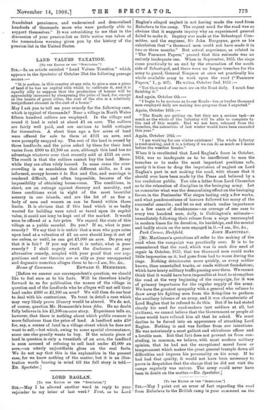LORD RAGLAN.
[To THE EDITOR OP TRIO " SPECTATOR."] SIR,—May I be allowed another word in reply to your rejoinder to my letter of last week ? First, as to Lord
Raglan's alleged neglect in not having made the road from Balaclava to the camp. The urgent need for the road was so obvious that it suggests inquiry why an experienced general failed to make it. Inquiry was made at the Sebastopol Com- mittee, and the engineer, Sir John Burgoyne, gave as his calculation that "a thousand men could not have made it in two or three months." But actual experience, as related in " The Panmure Papers," proved that this estimate was an entirely inadequate one. When in September, 1855, the siege came practically to an end by the evacuation of the south side of Sebastopol, and there were no longer trenches for the army to guard, General Simpson at once set practically his whole available army to work upon the road ("Panmure Papers," I., p. 407). He writes, October 2nd, 1855 :—
"Ten thousand of our men are on the Road daily. I much fear finishing it."
And again, October 6th :— " I begin to be nervous as to our Roads—ten or twelve thousand men employed daily are making less progress than I expected."
Again, October 16th :—
" The Roads are getting on, but they are a serious task—as much as the whole of the Infantry will be able to complete by the end of this month. Had we not been released from the trenches, the calamities of last winter would have been exceeded this year."
Again, October 20th :—
"I am working for our winter existence! The whole Infantry is road-making, and it is a lottery if we can do as much as I desire before the weather breaks."
When it is recollected that Lord Raglan's force in October, 1854, was so inadequate as to be insufficient to man the trenches or to make the most important positions safe, surely it is time to drop the imputation of neglect on Lord
Raglan's part in not making the road, with shame that it should ever have been made by the Press and believed by a too credulous public. You cite a letter from Lord Clarendon as to the relaxation of discipline in the besieging army. Let us remember what was the demoralising effect on the besieging forces in the Peninsular War sieges lasting only stew weeks, and what pandemoniums of horrors followed too many of the
successful assaults ; and let us not attach undue importance to a few cases of drunkenness—an average of one case to every two hundred men, daily, is Codrington's estimate—
immediately following their release from a siege unexampled iu modern times for its duration, its hardships, and the mental and bodily strain on the men engaged in it.—I am, Sir, &c., [Mr. Martineau's quotations all refer to the making of the road when the campaign was practically over. It is to be remembered that the road, which was in such dire need of repair in October, 1855, that ten thousand men could make little impression on it, had gone from bad to worse during the siege. Nothing deteriorates more quickly, as every soldier knows, than unmetalled tracks, or roads without foundations, which have heavy military traffic passing over them. We cannot think that it would have been impossible at least to strengthen the road at the very beginning of the campaign, for it was of primary importance for the regular supply of the army. We have the greatest sympathy with a general who refuses to draw away his fighting men from the firing-line to perform the auxiliary labours of an army, and it was characteristic of Lord Raglan that be refused to do this. But if be had stated clearly his need for road-makers (not soldiers at all, but civilians), we cannot believe that the Government or people at home would have refused him all that he asked. We must decline to be forced into an appearance of attacking Lord Raglan. Nothing is and was further from our intentions. He was notoriously a most gallant and chivalrous officer and a lovable man. But that fact does not prevent us from con- cluding, in common, we believe, with most modern military opinion, that he had not the exceptional moral force or temperament which makes the great general trample down all difficulties and impress his personality on his army. If he had had that quality, it would not have been necessary to prove in despatches that the charge that be did not visit the camps regularly was untrue. The army could never have been in doubt on the matter.—ED. Spectator.]










































 Previous page
Previous page